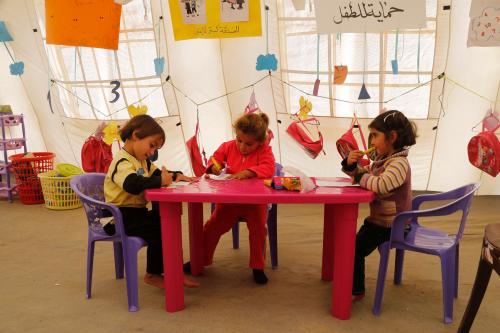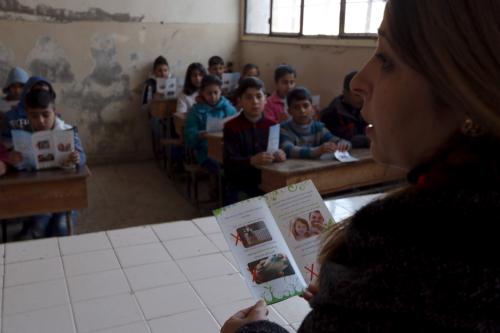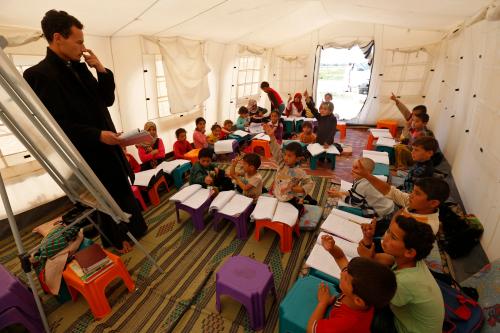Refugee children are five times more likely than their national peers to be out of school. Almost 4 million refugees globally do not have access to school, among them nearly 900,000 Syrian children and young people.
The absence of educational opportunities for refugees fuels ongoing migration, xenophobia, and despair. A good education, on the other hand, is fundamental to enabling bright futures for refugees.
The goal to increase the number of refugees in school—an issue that is shaping conversations at the United Nations General Assembly meetings this week—is an important one. To create the kind of education that does enable bright futures, however, this global action must include the following three dimensions:
- Funding that is multi-year and predictable. Exile for refugees is usually protracted. Between 2005 and 2015, two-fifths of all refugees were displaced for three or more years at any one time, and the average length of exile was 17 years. For many children, exile is their one shot at education. Planning for a complete cycle of education requires predictable funding, which has been missing from refugee education.
Encouragingly, educational planning is increasingly linked to development priorities, with possibilities for longer-term planning. Historically, refugees have been absent from national development plans and education sector plans. Yet recently, Chad, Cameroon, Niger, Pakistan, and South Sudan have included refugees in provincial and national planning documents. This action can facilitate multi-year planning and global support. For example, in 2016, Chad became the first country to receive funding from the Global Partnership for Education to support the education of refugees.
In most refugee contexts, however, multi-year, predictable funding options remain an ongoing challenge. The newly launched Education Cannot Wait holds promise in its attempts both to increase the amount of funding available for education in emergency settings and to ensure its predictability in protracted settings. To be effective, it will need to mobilize significant new funding and ensure coordination among humanitarian and development actors.
- Support for the education systems of neighboring states. Over 85 percent of refugees continue to find exile in a country that neighbors their country of origin. This country of exile is usually a low or middle income country that faces numerous financial and political challenges, including a struggle to educate its own citizens.
Promisingly, in these contexts, even amid major resource constraints, organizations and governments have worked together to create opportunities. National Ministries of Education in Turkey and Lebanon are working to enable refugees to access national schools; the Kenyan Ministry of Education has partnered with U.N. High Commissioner for Refugees to register camp-based schools as formal Kenyan schools; and the U.N. Relief and Works Agency continues its long-term investment of substantial resources in schools and teacher training and shows strong academic results. Yet individual nation-states cannot bear the financial costs alone. Only political commitment to a shared global responsibility for the futures of refugee children and young people can enable their education and the harnessing of their many potential contributions to the global community in which we live.
- Building open labor markets in neighboring states. Refugees continue to be without the right to work in many countries of exile. Closed labor markets mean that even refugees who do have access to education graduate without the ability to make use of that education to create livelihoods and participate in society. Refugee education promises safe and engaged environments in the present and the ability to be productive civically and economically in the future.
But this promise of education is empty without the right to work. Unemployment is rife in many countries of exile, and global support is essential to work with neighboring states to grant work permits and, moreover, to create employment opportunities that can benefit both refugees and nationals.
As an unprecedented global conversation on the education of refugees unfolds this week, let it be not only a temporary clarion call. Let it be the basis for global commitment to these three principles in order to facilitate greater resources and collaborative work toward meeting the educational needs of refugees globally.






Commentary
Three principles for global support to refugee education
September 21, 2016